It's not about the children

I started preparing the weekly Fodder on Wednesday but ended up writing way too much on just a single issue, so what I'm going to do is postpone it to Monday. There are also a few public holidays coming up soon, so expect the usual schedule to be a bit more random than usual.
With that out of the way, the issue that got me fired up was the government's proposed ban on social media for children. The specific age hasn't been confirmed – the draft legislation is yet to be released – but it doesn't matter whether it's 5, 7, 11, 13, 17, or 19: it's a bad idea that, along with the disinformation laws announced yesterday, will set freedom of expression in Australia back even further than it already is.
We've been here before
In 1985, Prime Minister Bob Hawke proposed rolling out an Australia Card. Its stated purpose was to help the government crack down on tax evaders, but with the side effect of collecting "data about individuals from different aspects of their lives".
People weren't happy:
"The Australia Card was a potent symbol. At first it was a symbol of the government's attack on tax avoidance. But, due to the efforts of many individuals and groups, it became the symbol of government snooping into the lives of Australians. The campaign against the Australia Card was an amazing success, especially in bringing together people from different parts of the political spectrum."
The whole saga was quite controversial; Bob Hawke even called a double dissolution election on the issue in an attempt to secure the Senate majority he needed. He was returned to power but with no majority, and was eventually forced to shelve the idea.
However, a year later the government got what it wanted anyway by making amendments to the existing tax file number system, with the promise:
"[T]hat it would be used only for taxation purposes. Yet within two years it was being used for nearly every payment of pensions or benefits by any Australian government agency, with the sort of meshing of computer databases that critics of the Australia card had warned about."
The same assault on privacy is happening again but this time it's under the guise of preventing misinformation, addressing the purported harms of social media, and of course "keeping children safe", rather than cracking down on tax evaders:
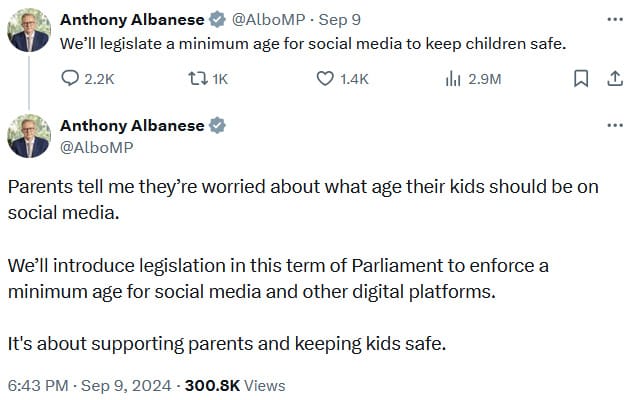
Here's more from Albo:
"Parents are worried sick about this.
We know they're working without a map. No generation has faced this challenge before.
The safety and mental and physical health of our young people is paramount.
Parents want their kids off their phones and on the footy field. So do I."
I just don't get this. There are around 10% more Australians engaging in regular physical activity than there were in 2001 (i.e. well before social media). 93.7% of kids aged 15-17 participate in physical activity at least once a year, and around 85% of those aged 5-14 (yes it's a big, diverse cohort but those are the data we've got).
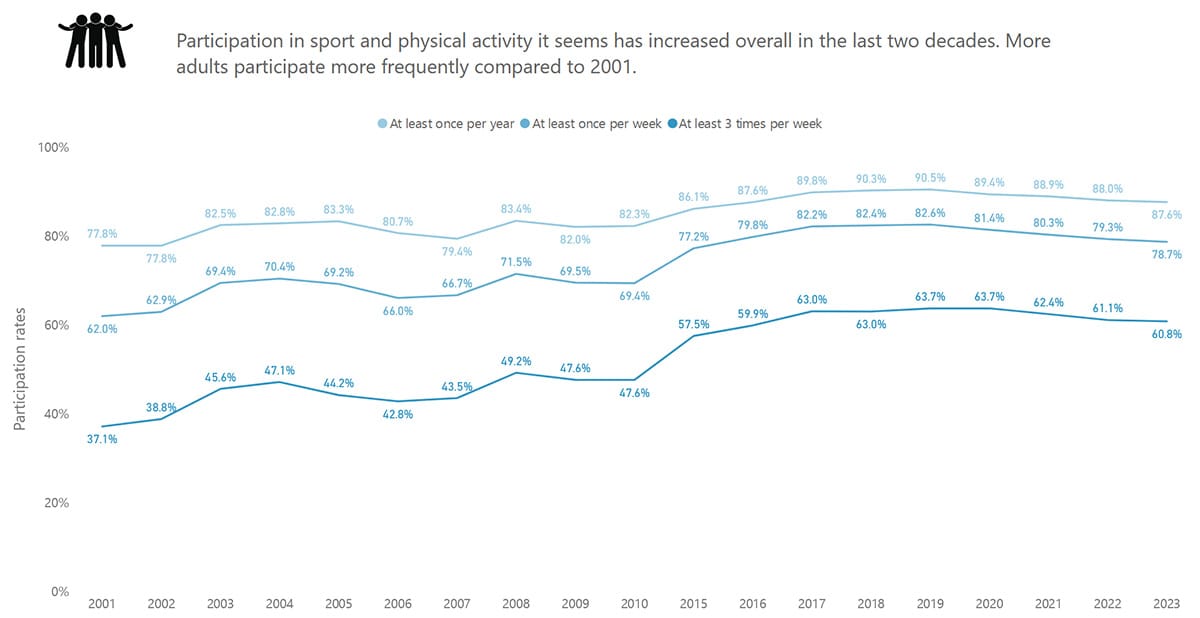
Perhaps fewer kids are on the footy field because they're now doing other things, like going to the gym or playing soccer – footy's participation rank among those aged 15-17 in 2022-23 was 9th, down from 6th in 2020-21. Either way, one guy's observations are a poor basis for setting nationwide policy.
As for the claim that no generation has faced this challenge before, I guess that's technically the truth but I think Albo's belittling other, more challenging transitions our ancestors faced. For example, telling your kids to use their smart phones a bit less strikes me as an easier challenge than going from hunter-gatherers to agrarians, or from rural to urban dwellers. Hell, just 30 years ago almost no one in Australia used the internet. Now everyone does:
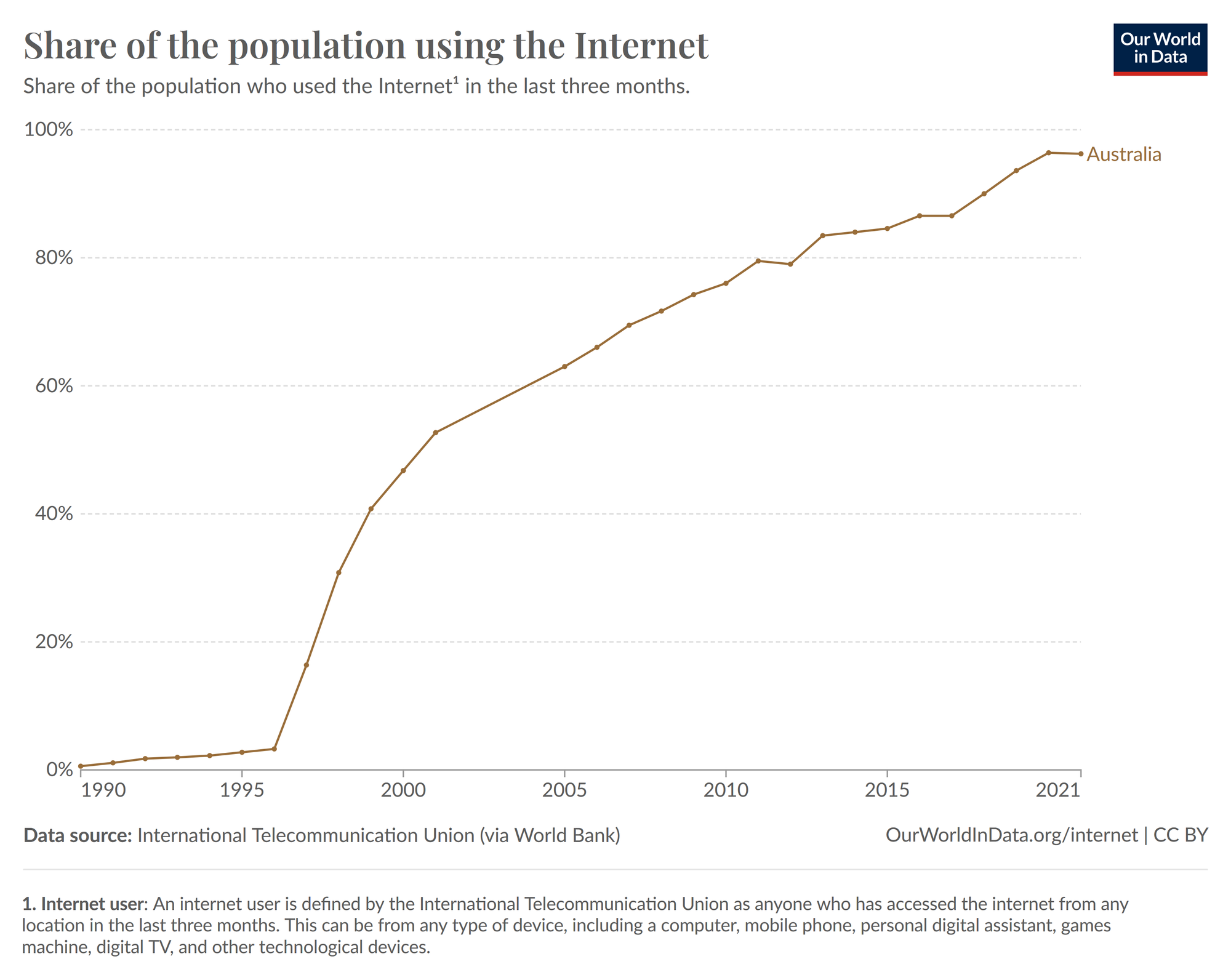
So, Albo sat next to some parents at his kids' footy matches and heard stories about how much time they spent on their phones. Rather than discuss parenting strategies, Albo decides to use the strong arm of the government to force all parents, good and bad, to respond in exactly the same way. Have a child who would benefit from testing their ideas on Twitter or Reddit? Too bad, the government's not going to let you raise them the way you want (legally, anyway).
The harms are overstated
I've written many times about the dodgy science on which the alleged costs of social media are based. At best, the evidence is misleading people to draw the wrong conclusions (e.g. by confusing correlation and causation); at worst, they're being deliberately deceptive.
The actual science generally shows that the causal effect of social media on mental health is "statistically no different than zero". When they do find harms it's mostly for girls, yet a look at the Australian data shows no noticeable rise in female self-harm following social media becoming widespread (it's actually down 20% from its peak in 2012, two years after Instagram's release), and the level remains low compared to boys:
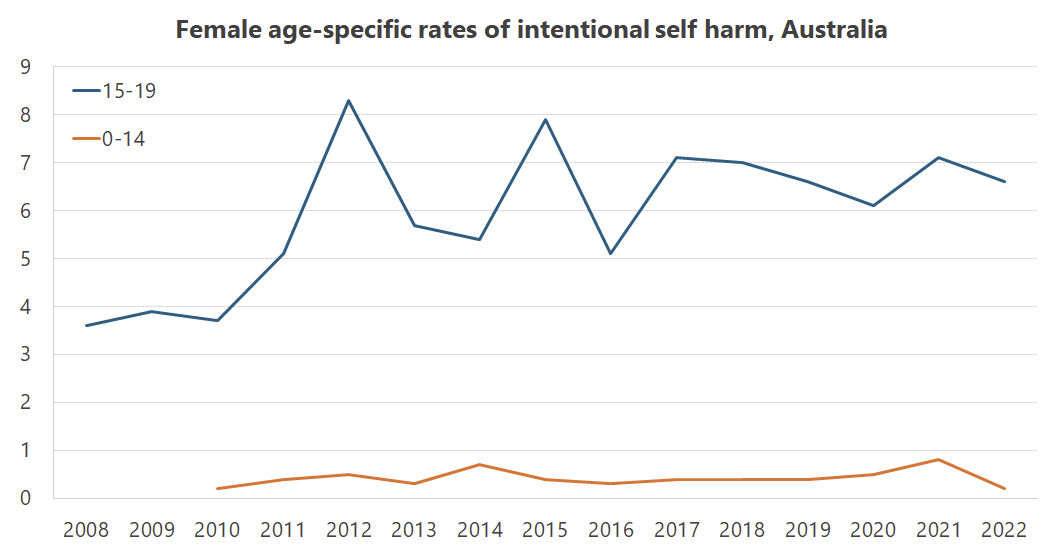
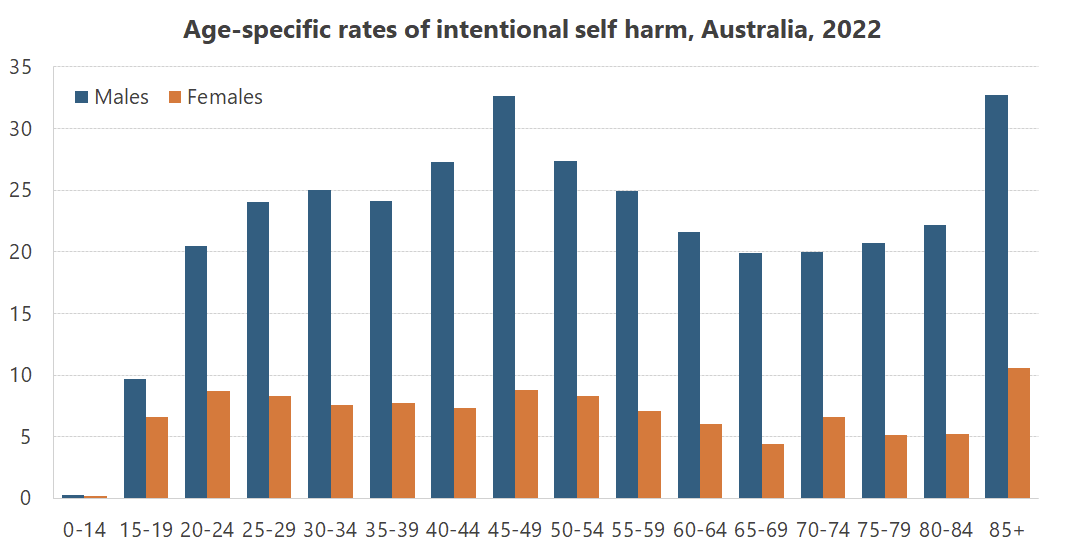
Going back to 1950, there's no clear 'social media' jump in self-harm and the trends vary widely by country, even though social media has taken over everywhere. If anything, we should be most worried about a recession; the late 1990s were a bad time to be young in Australia:
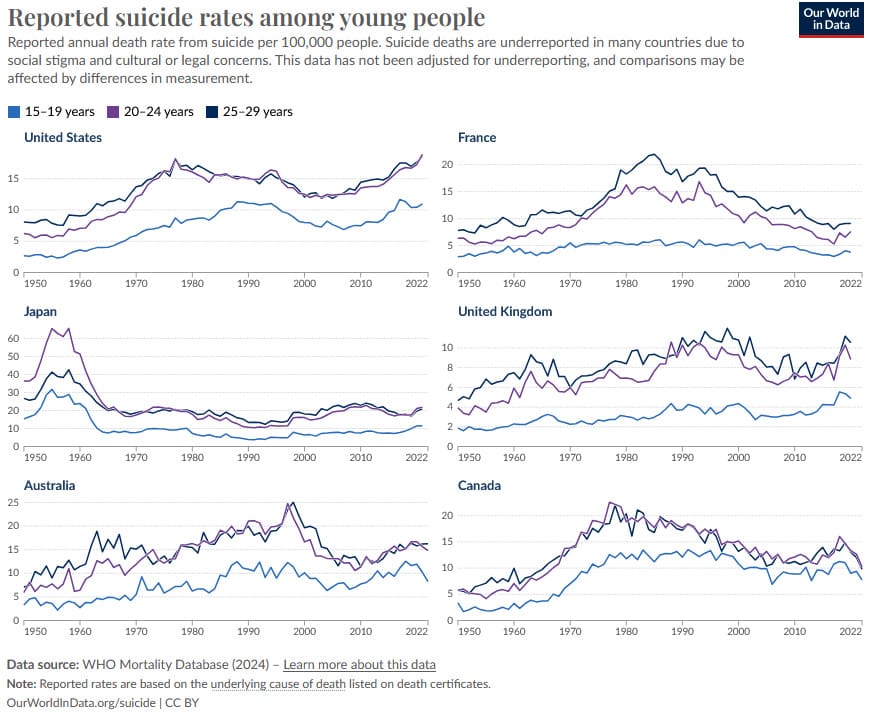
Of course, that's all in aggregate; is it likely that some – even most – girls aged 12 to 16 are worse off because of Instagram? Sure. But there are lots of things that are harmful for small cohorts but beneficial for many others. For example, the internet might make women aged 15–24 less happy. Should we ban that for everyone aged under 24?
Look, I'm all for measures to reduce the influence social media has on the lives of our youth. I wouldn't even object to a nationwide ban on phones during school hours. I would also support government efforts to improve norms around phone use, promoting alternatives including those that allow and encourage more free-range childhoods. You won't see me doing it often, but on this issue I wholeheartedly agree with the Greens, who oppose social media age limits:
"We need to teach children how to use social media and understand there are many positive benefits, particularly for marginalised kids, to being online."
The Greens considering trade-offs... well now I've seen it all! But they do bring up an important point: curiously missing in all the political statements about the alleged harms of social media is anything about the benefits, not just for marginalised kids, but also for the adults who will be caught in this web.
Unintended consequences, #592,012
Social media platforms already have age limits. I'm not familiar with Apple, but Android phones have something called Family Link, which lets parents set age limits by app, require parental approval for every download, and set daily time limits.
Some kids inevitably bypass those limits, which is where the government's bill will come into play: it's going to have to force these apps to improve their verification efforts.
But the only way to effectively stop children from using social media is to require adults to also verify their identities, which is basically a ban on the freedom to remain pseudonymous online. In effect, everyone in Australia will have to use their myGov Digital ID or whatever they end up calling it – an Australia Card equivalent – to access sites for which the government deems it necessary to require proof of age. The legislation to do this was rushed into law earlier this year with only three weeks of consultation, so they're ready to go.
And don't think it will just be Twitter and Instagram. The government is going after gaming and adult websites, too. Of course, you could always go and verify your ID in person – a Digital ID is "voluntary" – but that's not realistic for internet-based services: are you really going to fly to California to verify your Twitter account? Want to watch YouTube or browse Reddit without an account, so that those companies can't track your every move? Better get a good VPN!
Once in place, the government will be the guardians of this Digital ID. They will know when you sign into a website. When you post something. Your browsing activity across sites to which you're signed in. LawyersWeekly recently outlined the slippery slope we find ourselves on:
"The centralisation of every Australian citizen's private and sensitive information in one place should be enough in and of itself to be feared, and we have now seen instances around the world where the centralisation of this data presents a real problem (e.g. India). As stated by the NSW Council for Civil Liberties (NSWCCL): 'It potentially creates a 'honeypot' of personal data stored in a centralised database that would offer a tempting target for cyber criminals or hostile nations.'
Indeed, it is our view that this proposed new legislation could, in fact, have the opposite effect of what is intended in terms of security. Surely, the practical consequence of this will be that there will be more data being collected by the government, all its agencies, including law enforcement, the Australian Taxation Office and large companies, which will continue to collect what information they need and store it. So, really, it provides hackers with another lot of entry points that may only be a password away from all that centralised information.
This is an extremely dangerous proposition. It also represents a serious incursion into the legal rights of Australian citizens to privacy. Most don't really know how fundamental that right is until it is taken away. The problem is, once we provide these powers to the government, it is extremely difficult, if not practically impossible, to gain those freedoms back."
The surveillance dragnet expands. Nothing to see here dear citizen, please present your Australian government issued porn ID and move on. Next stop, China.
It's a real shame
These age limits, which are fully supported by Peter Dutton – a former police officer who, if this passes, may one day have access to every Australian's social media, gaming, and browsing history – are the wrong way to deal with this problem. Social media is fun and informative for many teenagers, and their benefits could far outweigh the costs it has for a few. As Dana McKay, Associate Dean, Interaction, Technology and Information at RMIT, put it:
"Social media is one of the only public spaces where children can communicate directly with their friends – often maintaining connections with distant friends and loved ones that would otherwise be impossible.
Banning children from social media is a blunt instrument that ignores the social benefits children get from having direct communication with their friends."
Do we need to, at the margin, help kids (and parents!) manage it better? Absolutely. But you don't do that with arbitrary, one-size-fits-all age limits, which it turns out are just one facet of a broader recent trend of government overreach into our lives: yesterday the government also revealed it will soon have new "powers to force tech companies to crack down on misinformation and disinformation on their platforms".
Fostering misinformation is of course bad, but it's also not an appropriate target for the law. It risks straying into the realm of unjustified censorship, and goes against the idea that the freedom to be wrong is just as important as the freedom to be right. Especially as the bill's definition of "serious harm" includes vague terms that could see almost anyone hauled up to answer to a panel of bureaucrats:
"The types of harm in the Bill are: harm to the operation or integrity of an electoral or referendum process in Australia; harm to public health in Australia including the efficacy of preventative health measures; vilification of a group in Australian society; intentionally inflicted physical injury to an individual in Australia; imminent damage to critical infrastructure or disruption of emergency services in Australia; and imminent harm to the Australian economy."
The last point is especially concerning for me – is criticising the Treasurer soon going to be illegal? What about the central bank? What if someone wanted to blow the whistle on a large company that was running an Enron-style accounting fraud, but doing so would cause "imminent harm" to the economy?
Being free to express your views – even "wrong" ones – ensures they're challenged in the light, rather than festering in the inevitable black market sewer of ideas until they explode, causing much greater damage. The ability to speak freely is an essential liberal democratic value, even if the government of the day considers it "misinformation".
The government certainly got a lot wrong during the recent pandemic; if one were to strike again with this new bill in place, would anyone questioning the "official" advice be censored? The inability to even question the "efficacy of preventative health measures" certainly makes me think that would be "yes".
Honestly, this has been a bad week for Australia. I fully expect policies like these from the Coalition, which has never much cared for civil liberties. But Labor? They should know better.
When this government was elected, it promised to be a breath of sensibility following the chaos that was Scott Morrison – to "allow debate and be accountable for the decisions it makes". But with every passing day, their actions – whether it be flexing on the independent central bank, rushing legislation to give itself more power, spreading its own misinformation on energy and emissions, or the complete lack of a reform agenda – are indicating that not only are they no better than the previous mob, but they may even be worse.
And that's a real shame.
Have a great weekend.


Member discussion